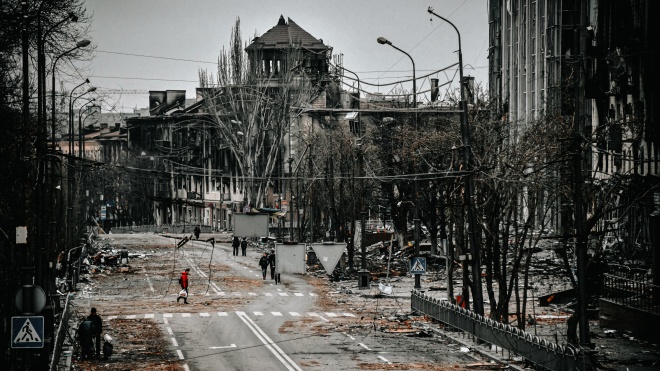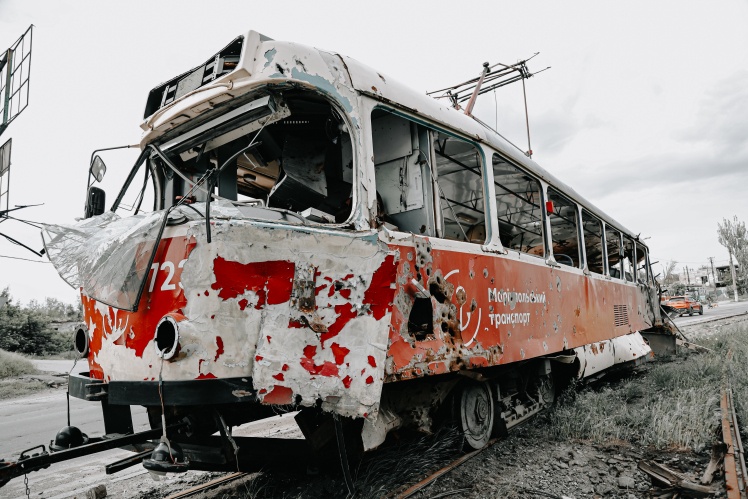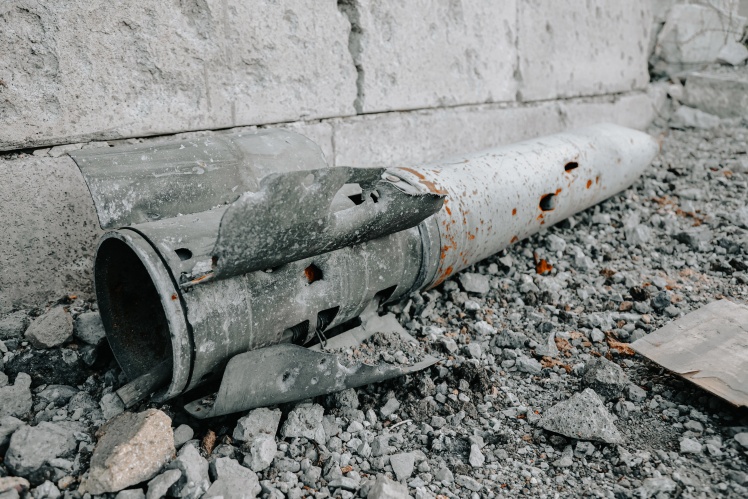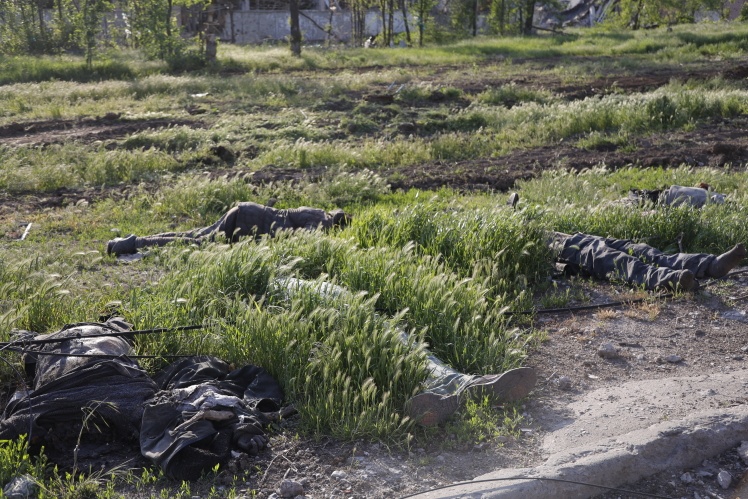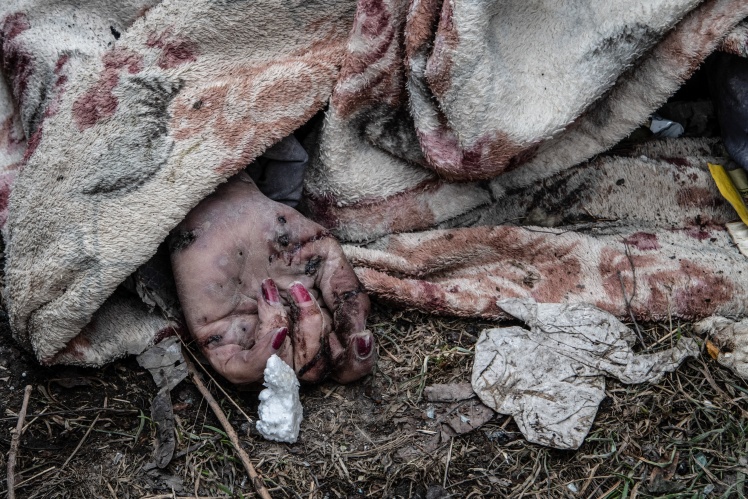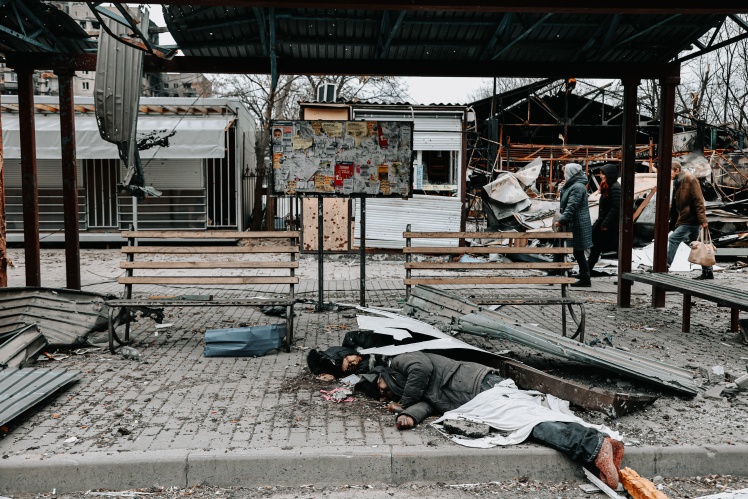In the basement
Yulia: My morning on February 24 started with my motherʼs call at the beginning of the seventh. She cries: "Julia, the war has begun." I started calming her down: "Mom, everything will be fine. Why are you [so upset]? ” Then a friend called me: "Julia, donʼt take children to school, go buy bottles of water and bread just in case." Then [the school authorities] wrote to the school group chat in Viber messenger: they decided that the school would not work, the children would stay at home. I didnʼt panic, no one was afraid, because the mobile connection was there, the Internet was working too.
Then shellings of the Eastern {Vostochny} district on the outskirts of the city started. Just like in 2014. At the time, I didnʼt think there would be an apocalypse. I thought it would be like in 2014: Russians will shoot, but our troops will repel them and everything will be fine. We worked on February 24-25. I work in the technical support service, we have worked from home since the beginning of the COVID-19 pandemic. On the weekend of February 26-27, all shops are open, transport functioned as usual. Although at that time, both on the east side and on the other side, they [the Russians] were already advancing. February 28 was my motherʼs birthday, we gathered in the evening and congratulated her. We had no panic or fear. Everything worked, the city functioned as before.
And on February 28th we received a newsletter from the company director: “Dear colleagues, employees, everything is fine, we have everything under control, letʼs not panic. Ilyich and Azovstal steel mills will be stopped, we are working as usual." There were no hints of evacuation, or what to take and eat or stock up on.
And now I already understand that special trains were launched from Mariupol to Lviv, but it was possible to leave only on February 24 and 25, on Thursday and Friday, and thatʼs it. Only these two days. But since we were reassured that everything was fine, no one rushed anywhere. Even those who have cars.
And on March 1, the lights and mobile communications were turned off, the sounds of shelling became more audible. We realized that Mariupol is encircled. For one day, our utility service providers restored electricity supply, on the morning of March 2 everything was fine. But in the evening the occupiers smashed the [cellular] communication towers, so mobile communications, Internet, and eventually electricity disappeared. The transport stopped working. The sounds of shelling began to approach. Planes have already started to fly, Azovstal was under fire.
Damaged tram at the depot near the Azovstal plant. Mariupol, May 21, 2022. Remains of a shell, Mariupol, May 21, 2022.
Getty Images / «Babel'»
My parents and I lived very close to each other: they were on the fourth floor and I was on the first floor [of an apartment building]. And on March 2, I invited Borys and my mother to move in with us, because it would be difficult for him to constantly go to the basement from the fourth floor. In our basement, people have already started to settle down, to run from houses where there were no basements. We barricaded my apartment and closed the windows. In the afternoon people started going down to the basement, because it was already loud. But I spent another two nights in my apartment, my children and I were on the floor in the corridor, Borys also had an improvised bed. These were not nights, but just horror. We lie down and hear the plane flying, dropping bombs, which seem to fall in the yard nearby. On the third night they decided to stay in the basement, but I still sometimes ran to the apartment during the day.
We were saved by the fact that when there still was running water, my mother filled all the pots and pans with water. We brought all this in the basement. Fortunately, the building was relatively intact throughout March. There was a family for which our basement was already the third one, two previous houses burned down, and they had nothing left at all. In total, there were 30-40 people in our basement, including 8 children.
The gas supply was already turned off, all the people were cooking on the fire, and the frost hit Mariupol, it was minus 10-12 degrees Celsius. Itʼs cold, we were wearing four pants, boots, slept under three blankets. And then the apocalypse began. The house was shaking. When the shells flew, we thought they hit the house, though they hit the next yard.
Borys, Olga and Yulia. In the foreground — Sonya and Tanya. Borys himself provided the photo to Babel.
«Babel'»
We had a kindergarten across the street. It was under repairment, the carpets had already been delivered, and the building was about to open. And there was a military unit across the boulevard. They [the Russians] hit the military unit, they hit the boulevard. There are two schools where children went, a clinic nearby. The first blows were to clinics, schools, kindergartens, and all infrastructure buildings. One thing that we saw it — but our children also saw and heard all this, which is especially sad…
Borys: On the night of March 21, there was one moment. Everyone was asleep, just Olya and I woke up. And then the blast happened. A few seconds pass, and then another explosion. The house began to shake so much that the glass shattered. Olga and I looked at each other and began to pray. We didnʼt understand what had happened. Then one man, who was on the 2nd floor, said this was an airstrike. The first bomb hit the military unit, the second hit kindergarten. Itʼs 50 meters from us. I have never felt such horror in my life. There were Grads already, shooting, long-range shells. But aviation is completely different. Sitting in the basement, we learned to distinguish between mines and Grads. And when you hear a reconnaissance plane, then itʼs a thing that there will be an attack in a few minutes.
Yulia: March 26 was supposedly quiet, we decided to go up to the apartment. My motherʼs gums hurt, she had to cut them herself, there was inflammation. Borysʼ legs were also inflamed, they had to be treated with medicine. And then the mortar shelling began. I and children went to the basement, and my mother stayed with Borys to treat his legs. It didnʼt hit our yard before [and we hoped weʼll be safe this time too].
I thought I would never see my parents alive again. Mortars were fired for over an hour. And parents are in the apartment. When it was over, I just didnʼt recognize my apartment. The window was knocked out. One piece of the shell flew in, pierced the folded carpet, cut the jacket that hung on the bed, pierced the dresser with clothing in it, pierced the wall and cut a neighborʼs shoulder in another apartment. Thatʼs the power with which it flew. My mother and Borys were lying on the floor at that moment, covered with orthopedic mattresses. Borya lies down and sees white fluff flying around the apartment. He thought that he was dead and in some other dimension, that it was paradise already. It then turned out that the shard tore the fur jacket.
After March 26, we did not leave the basement. Just ran out to heat the water, as there was already a fire in the yard. We have small children, and they need warm water. We were also lucky that we had such a well-coordinated team in the basement, families, and also single grandmothers came to us, someone was left there by her son, someone was just lonely. And I said, “Mom, I canʼt eat when they are hungry.”
Street "kitchen", where Mariupol residents cooked food. March 29, 2022.
Getty Images / «Babel'»
We fed them together with other neighbors, took care of them. Our grandmother was on the 5th floor, she barely walked. We ran to her, brought her tea and hot soup. We held on as a community. Now I read stories about how people were not allowed in some [already occupied] basement, how someone didnʼt eat. We did not have that.
One need to have extraordinary courage to just go out in the morning and light a fire when everything around is whistling [due to the shelling]. Sasha, our neighbor, was wounded by shrapnel when he was taking care of that fire. Overall three people were injured like that. But still every morning there was boiling water, borsch was still being cooked, my mother was making pies. You cut everything, run outside, put it on the fire, then run to the basement. And everything around whistles and falls.
Borys: Our neighbor, Kyrylo, also went out in the morning to cook, and something exploded nearby. I heard all this, I was lying down. His wife ran out, shouting: "Kyrylo, where are you?" She started screaming loudly in a second, and I thought that itʼs all, [he was killed]. He didnʼt answer for ten seconds, and then: "Iʼm here, here." He was badly injured.
Yulia: Once a missile got into our basement. In the morning we look, something iupierced the iron door to the house, the iron door to the basement and crashed into the sewer pipe. When you lie under these shellings, you pray and ask, "Lord, may I please die instantly so I will not suffer." And our children did not cry, they sat in silence and prayed with us.
Olga: We realized that Mariupol was left [by the authorities], that there is no help. No evacuation. People who had cars all left as soon as possible. They also took a risk, but it was possible to leave for Melekyne from March 15 to 20. Some people went there by foot. We stayed because we donʼt have transport. Itʼs understandable that Borys couldnʼt go by foot. But we still had nope and were waiting for the [evacuation] corridor.
I was preparing for the war a little: bought canned food, bread, dried crackers. I salted lard, there were two three-liter jars of oil. I had three 20-liter tanks, I filled everything with water. And whatʼs more interesting, I make canned food every year, but of very little amount. And last year, for some reason, I made a lot of lecho, picked tomatoes, and pickled cucumbers. They saved us. We fed everyone in the basement with these cucumbers and tomatoes. All the food was taken there. There were also private small sheds, which were warmer. I wrapped Yulia and the children — Sonya and Tanya — in such a shed in a mattress cocoon to keep them warm.
Broken conservation cans in Borodyanka, Kyiv Oblast. May 11, 2022.
Getty Images / «Babel'»
When we ran out of candles, we made them from sunflower oil. Oil and cotton lamps, my grandmother used to do that. I found a jar of church lamp oil in the basement and also used it.
As a result of constant stress, I completely lost the feeling of fear. When we were fired upon on March 26, when a fragment hit the apartment, I covered Borys with mattresses and heard our neighbor, Anya, start shouting that their mother had stayed on the fourth floor. I ran to calm Anya down. She shouts to Oleg, her husband: "Go see whatʼs up with mom." I see that she is hysterical. And I said to Oleg: "Stop." He already wanted to run. And I didnʼt let him. Just said: "Yes, there is a mother, but think about yourself, what are you doing?" I also managed to run home, take soothing drops, put them in a cup and give Anya to drink them. Borya shouts: "Stop running, come here." And I honestly lost my sense of fear. But later got into the room, laid down next to Borya. And this [shell] fragment flew exactly in the place where I just stood.
There were a lot of pro-Russian people in the basement with us. I was arguing with them, I was fighting a lot. They are filled with this Russian propaganda. We understood that we were being bombed, and Russia was bombing, and they said, "No, thatʼs not true, they promised to shell precisely." It got to the point where I said, "Now Iʼll tape your mouth with a scotch tape." If the occupiers had come to us then, someone from my house would probably have betrayed me. Despite the fact that I took out the [poo] pots from under them, Julia and I fed them our food. Itʼs still necessary to feed the old, we couldnʼt eat and not share.
On foot arounf Mariupol
Yulia: After this mortar shelling on March 26, I had the first sign to go out. Before that, I couldnʼt cry or panic with the children, because they were looking at me. But then I started crying and said, “Mom, I realized that these beasts are destroying the whole city. Residential, non-residential buildings, they do not care. We have to get out of here." Everyone started persuading me not to go, because how? There are no buses, nothing, and itʼs cold outside. I calmed down and we stayed. But people already began to go out into the yard, then ran for water, some ran from other yards to us, some said: "This is it, across the road is ʼDPRʼ already.”
Damaged buildings in Mariupol, May 21, 2022.
Getty Images / «Babel'»
My brother Oleksiy serves in the Ukrainian army, my mother kept his old military uniform and the Ukrainian flag in the apartment. And I say: “Mom, they will come in now, see Oleksiyʼs uniform, flags. They will ask: who lives in this apartment? Do you understand what will happen then?”
On the second of April we heard a knock on the porch. It was closed, local men made the barrier bar. And on the street everything is whistling, you canʼt leave the entrance at all, you canʼt even leave the basement. And someone knocks: "Open!". And starts shooting from the machine gun: trat-ta-ta. My heart sank, I rushed the children under the table to my mother, we all hid, were holding our breath. The locals opened the door for them [the soldiers], they came in. And I look, and these are ours, [Ukrainian]. God, these are our soldiers! Azov. We thought they were gone. They say, "How are you guys?" And then tell: “We are surrounded. Who else is in this house in the apartments? It is very dangerous to stay here. Everybody has to go down to the basement."
They helped this grandmother, who was on the 5th floor, to go down. And I tell them: "Guys, we have 8 children in the basement and run out of everything already." They let that grandmother down, then went somewhere. Half an hour later they call me: "Yulia, come here." They brought us water, food, sweets, cookies, juices. I donʼt know where they got it all. They said: "Itʼs for children, but itʼs very dangerous to stay here." And left.
I realized that I had to go from there too, because these supplies may be the last. The plane will arrive, drop the bomb, the fire will start, and we will jump out, but Borya wonʼt. He will either suffocate if the house catches fire, or we will not pull him out from under the rubble. And there were already rumors that in the METRO store orcs began to distribute humanitarian aid, and there were buses nearby, taking people out. We did not know where they were being taken, but we knew that they were no longer shooting there.
Satellite image of the area near the METRO shopping center in Mariupol.
Getty Images / «Babel'»
We had a wheelchair, but for a room, not for the street. We planned an approximate route to the 17th district, collected our things, each got a backpack. A guy and a girl were with us in the basement, they have a 5-year-old boy, and they decided to go with us. Neighbors were telling me not to go anywhere: "Yulia, where are you going? We are a team. We will find water. Where will you go? You understand that itʼs 50 percent [chance to get killed]. At best, you and the girls will be raped, and at worst, everything will end." But I understand that if we stay, it is 5% probability that we will be alive.
On April 4, on the 40th day of the war, at half past five in the morning we came out of the basement, took Borya out in a wheelchair, put a white flag on his crutch, and icons for the children. And then a mine flies to us from the next yard, explodes near the first entrance [to the building]. Boom, we are all falling, our neighbors are shouting: "In the basement, in the basement! Where will you go? Stay!” And I got up, looked at my mother and said, "Mom, weʼre leaving."
For all time we were in the basement, we didnʼt see what was happening in the city, only heard. And now we saw that all the houses were burned down, destroyed, there are many dead people, cars, fragments of the missiles, soldiers, wires were lying everywhere. The wheelchair could not pass due to the stones, so we cleared the road beforehand.
The children went a little further with the neighbors, and I was behind them. Suddenly the door of the entrance to the nearby building opened, a barrel of a machine gun was aimed at me. There was an orc with the beard to the waist. He starts shouting: “Where are you from, beast, what are you doing here? Iʼll shoot you now, bitch. Go to hell!” And points a machine gun at me. I think, "Lord, please let the children go forward, even if Iʼll be shot now, they have to go forward, they donʼt have run to me and cry." And this soldier with crazy eyes says again: "You beast, Iʼll shoot, go the f*ck away from here, bitch, go." He just screams, itʼs not even talking. I didnʼt say anything, just moved on. I told to myself: Yulia, you either go, or your life is over. The main thing is that the children are ahead of me. But my mother and Borys were in a wheelchair behind him [the Russian]. He said to them, "Get out of here!" And they went the other way, so we got separated. And we went a little further, stopped and started waiting. At least we didnʼt hear the machine gun shooting, because if we did, it means that lunatic shoots my parents. And then I look — my mother is already leaving in other direction. And I canʼt shout, I canʼt wave my hands, because we were warned that snipers react to sudden movements.
We went on, and met the orcs again. "Where are you going?" they ask me. I say: "For the humanitarian aid." They say: "Well, donʼt go there, as there will be shelling now." They jump out with a hand mortar: "Fall, now we will shoot!" He fired and then said: "Look under your feet, there are mines that didnʼt explode." And when we went, my younger daughter Tanya pointed to all the mines., so we bypassed them. There were five of these [unexploded] mines.
We passed about halfway, and Borysʼs cartʼs wheel fell off. My mother and I pulled the other half of the wheelchair with our arms. Mom lifted it — and I pulled instead of the wheel. At one point Borys fell, and his legs were all in hemorrhages. I donʼt know how we had enough strength [to make it]. Children see corpses everywhere, quietly crying. We usually walked this distance in 30-35 minutes, but then it took us 2.5 hours. I thought I would take off my hat, and it turns out my hair is totally gray. This was the road of horror.
Dead bodies in Mariupol, May 21, 2022. A woman who died as a result of the shelling is lying on the side of the road in Mariupol. Dead bodies in Mariupol, April 4, 2022.
Getty Images / «Babel'»
Borys: I could not imagine that these fragile women could pull me in a wheelchair. That Yulia and my wife will have enough strength to pull me, such a boar, through the whole of Mariupol.
Olga: There was already half a boar left, though. We all lost weight. Yulia was thin before that, I lost 8 kilograms and Borya lost 6 kilograms. In general, we were in a state as if it al wasnʼt happening with you, but as if you were watching it from the side. We carried Borya in a wheelchair, and where did those forces come from? Though the fact that my daughter and I are very athletic, have always been involved in sports, also helped us.
Borys: Not only that, there were no roads. All roads were clogged with bricks and wires. And I was most impressed by the corpses, which for some reason they did not remove. Moreover, they did not remove their own [Russian soldiersʼ] corpses. Orcs are standing, and next to them lie the corpses of orcs. And also, I realized that they were the ones who shot at our house. Those who we met with a mortar launcher. They released the mine that flew near our house when we came out of the basement. They just stood and launched these mines wherever deliberately.
To Nikolske by bus
Yulia: We got to the finishing point. There were buses, but only to Nikolske. There the orcs say to me: "Stand, come here, beauty." And started booping me. My mother was not touched, Borya was not touched, and I was examined, as well as my backpack. And before leaving, I took a combat knife. Because I thought that if something happened, I just wouldnʼt let them [kill me], I would take someone [of them] with me. So I understand that if they find something, there will be questions. But the one who booped me turned away, and I managed to put the knife in the backpack, which he had already examined. God took the trouble away.
Exactly 10 minutes after we arrived at the hospital, we got on the bus. We were black, dirty, as we didnʼt wash or change clothes for a month. Only when it was raining or snowing, we heated this water and washed ourselves with it. But still the face was black, the hands were black. We arrived in Nikolske, we were placed there at the school. Itʼs cold, people lay on the floor, someone is crying, everything stinks. The orcs said there is going be some sort of filtering, and we had to form a queue. We were shocked.
Borys felt sick, his mother thought he had a stroke, he could barely move his tongue, he began to dream of something. He said, "If I donʼt lie down now, Iʼll die." And there were no conditions at school, even to lie down normally.
My mother ran outside and caught the car. The driver turned out to be from Mariupol, he started driving her around the private sector, my mother ran to every house to let us spend the night there. I knocked on houses, some did not open, some already had refugees. And she ran to one house, weak already, crying. An older woman, Godʼs dandelion, opened it, and her mother fell at her feet: "Let us go, please, I have children, a man with a disability." And she: "I do not let anyone in, I have no conditions. There is no gas, no electric furnace. " But eventually, she let us go. This grandmother is also one of our guardian angels, we lived with her for a few days. It was cold in the house, but we bought firewood and started burning the stove. It still was better than in that school.
So began the second level of our survival. There was a lot of military equipment, all with Z letters, Chechens went with beards, with machine guns. We signed up for filtration, and were said to wait there for 2 weeks until we are filtered. I said, “Mom, what filtration? They will just visit my Facebook page, and thatʼs it [theyʼll understand Iʼm pro-Ukrainian]." If you have someone in the Ukrainian army: a husband, a son, a brother — the Russians have a database. If you are an activist, they will also find this out. They will see in which groups you are in social networks. We would surely fail at the filtration.
“DPR Army” tanks move across the field in Mariupol, May 6, 2022.
Getty Images / «Babel'»
I started approaching the "DPR" volunteers, saying: "Where do the buses go from here? Is there an option to get to Zaporizhzhia?” And they looked at me like crazy: "Why Zaporizhzhia? Why Ukraine at all? Russia will soon be here. Buses go only to Donetsk and Rostov".
We lived without communication with my grandmother for 5 days. And here I was lucky again. I saw in the crowd my acquaintances from Mariupol. I rushed to them, and they replied: "Yulia, letʼs go, there is [an access to] the Internet." We used it secretly for 15 minutes so that no one knows, no one hears.
Finally, I contacted relatives. We have relatives in Germany, I called them, they said: "Yulia, get out of there." I said: "Here they take only to Russia." "Donʼt even think about Russia. We wonʼt get you out of there. Go only to Ukraine." And the next day it turned out that our relatives found a volunteer from the Baptist Church in Zaporizhzhia, a pastor. He, risking his own life, agreed to take us, strangers, from Volodarsk settlement. We had no permanent connection [with him], he only knew our address. At half past three the bus arrived, this Serhiy comes out of it. And says: "You have 10 minutes, run, throw things [in the bus]." He also brought a huge bag of food, humanitarian aid, so we gave a lot of food to the lady who sheltered us.
To Zaporizhzhia by car
Yulia: I thought I would not be afraid anymore, because I was already scared in Mariupol. But while we were passing these 22 [Russian] checkpoints, I was not breathing and my heart wasnʼt beating. We were all out of breath. The Russians did just everything. They searched us, intimidated, demanded money. They asked: "Do you have any food or donʼt?!"
Boris: On the last, 22nd checkpoint a very young boy approached our driver, Serhiy. He said, "Good afternoon." And Serhiy said to him in Ukrainian: "Good afternoon." Some kind of kamikaze! But this pastor is a strong man, he somehow oppressed them. And behind these Russians is their armored personnel carrier. Its hatch is open, one of the Russians sticks out and says to the one whoʼs checking: "Come on, shmonai them, shmonai stronger." And that one who checked approached the carrier, kicked that hatch and from there said to us: "Go".
And before that, at the checkpoint, another Chechen approached us. Through the window he said to me: "How are you?" I said, "Thank God, we are alive." He: "Maybe you need anything? Can I give you canned food?” This was only one [who proposed to give us something], the rest just took all they could. They demanded money from Serhiy. He gave a little to one and said: "This money will not benefit you. You already need to think about the salvation of the soul.” And the orc says to Sergei: "Well, pray for me then." Serhiy told him so seriously: "Everyone should pray for themselves." And went on.
Olga: My son Oleksiy also serves [in the army]. And his military ticket left at our home. He was in Poland when the war began. And then he came from Poland and wanted to come to us in Mariupol, but everything was closed there. In short, he had no way, and thank God he did not break through. And we had diapers for children, just in case. I put his documents, military ID, work ID, identification number in one of the diapers. As well as Oleksiyʼs military awards from 2015-2016. I worried so much that they [the Russians] find them. But they didnʼt look at diapers.
Yulia: After we passed the last checkpoint, I relaxed. And Serhiy says: "Yulia, and now the worst begins, 12 kilometers of the gray zone, where they shoot from both sides." And we did not go these 12 km — we flew. And we did this. The first Ukrainian checkpoint was in Orikhiv. We saw our flag, and all started crying. Because we already thought that we would never get to Ukraine. We saw our native land, our soldiers there. I ran out to hug them. It was so emotional. When we spent 40 days in Mariupol under fire, when I saw the Azov soldiers once, I was happy. And then in Volodarsk I saw these Z marks, I looked at these orcs, these stupid faces. Then 22 checkpoints with these creatures. And then our checkpoint... I canʼt describe it in words, I donʼt have such a literary talent. We will not forget this moment for the rest of our lives. The children were crying and the soldiers were saying, "Itʼs all right, youʼre safe, everything will be fine." And they gave fruits and sweets to children.
And pastor Serhiy, who took us to Zaporizhzhia, is a hero for us, we will never forget him. All the other volunteers looked at him, saying: "How? Serhiy, how did you go, how could you?” He says: "I donʼt know, but you canʼt go there anymore." He took us out on April 9, and on April 11th there was no entrance from Zaporizhzhia or to Zaporizhzhia [from the occupied territories].
We then went to Lviv, and from there — to Europe to our relatives.
Olga: Then we learned that our house collapsed. On April 4 we left the basement, and on the 8th a missile flew into the house. But I know that people had already left the basement at that time. Thank God no one stayed there. Now we are in Europe. I still canʼt understand how it happened. We were simply carried by angels. I donʼt know how to explain it. Itʼs just a miracle.
The house where Borys's family lived collapsed under fire on April 8, 2022.
«Babel'»
Borys: Days in the basement left a lifetime worth of impressions. Then the days dragged on, but now we have relaxed a bit and the days started flying again.
Olga: We confused the time [when we were in the basement]. We did not understand where itʼs night, and where itʼs day. At six oʼclock in the evening we went to bed, at four oʼclock in the morning we woke up. It wasnʼt a decent sleep — everything was mixed up. So time just stopped.
Borys: I was in complete darkness for 20 days, the only light was a lamp.
Olga: It was psychologically difficult. After those explosions on March 21 and 26, Borys began to suffer from depression. I understood this and said: "Borya, you need to get up, make at least two steps." And he didnʼt do that either, he refused to eat, covered his ears with earplugs and just lay down silently. And I was scared of his condition. On the fifth day of depression, I approached him, grabbed his collar, and said, "If you donʼt get up now, Iʼll just beat you here." He later admitted that he was upset about his condition and said: "I understood that you could not get out because of me."
Borys: And now Iʼm in Germany. Can stand and walk just like that.
Olga: He is laughing now.
Borys: And I realized that we were haunted by the number 40. We came out on April 4, the 40th day of the war. When we left for Germany, we left Warsaw at 4:04. In Germany we live in a house №40. Olga got a bank card, the figures in total give 40. Such an interesting coincidence.
Translated from Ukrainian by Anton Semyzhenko.
Support Babel:🔸donate in hryvnia 🔸in cryptocurrency 🔸via PayPal: [email protected].
